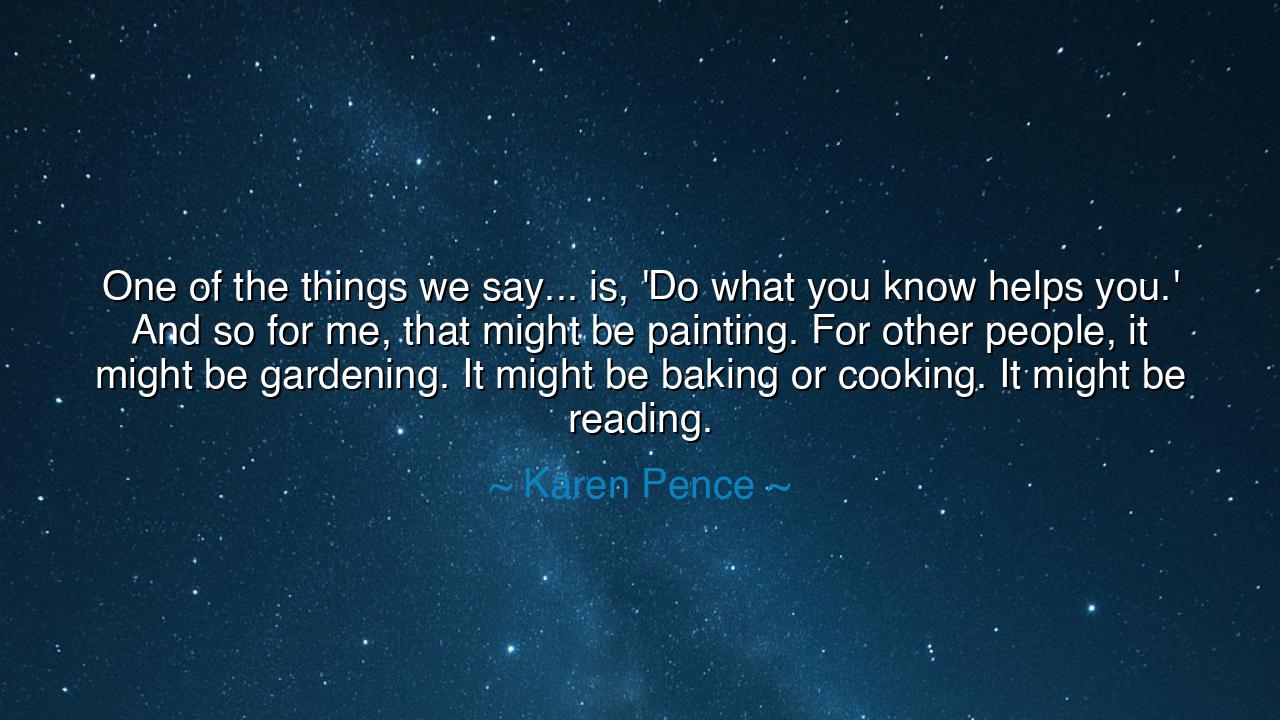
One of the things we say... is, 'Do what you know helps you.' And
One of the things we say... is, 'Do what you know helps you.' And so for me, that might be painting. For other people, it might be gardening. It might be baking or cooking. It might be reading.






Hear, O children of wisdom, the words of Karen Pence, who shares with us a profound insight into the healing power of simple, everyday practices: "One of the things we say... is, 'Do what you know helps you.' And so for me, that might be painting. For other people, it might be gardening. It might be baking or cooking. It might be reading." These words speak to a timeless truth—that every soul finds its sustenance in different ways, and that in moments of challenge, we must turn to the practices that nourish us, that give us peace and connection to the world around us.
In the ancient teachings of the Greeks, there was a deep understanding of the importance of cultivating the soul and the mind. The philosopher Aristotle spoke of the need to live a life of balance, where we engage in activities that nurture both the body and the spirit. He taught that the purpose of life was to find happiness through virtuous living, which often involved engaging in practices that brought peace, joy, and meaning. Pence's words reflect this ancient wisdom, reminding us that personal growth and healing come not only from the external world, but from the simple acts of doing things that restore our spirit.
Consider the story of the great sage Laozi, whose teachings in the Tao Te Ching emphasize the importance of returning to simplicity and connecting with the natural flow of life. Laozi taught that the Tao, or the way, could be found not in grand gestures or complex philosophies, but in the everyday practices—the simple acts of living in harmony with the world, such as gardening, walking, or cooking. These actions were not trivial, but essential to spiritual health. By returning to these simple, grounding activities, one could connect with the divine flow of the universe and find inner peace. Just as Laozi taught that simplicity leads to wisdom, so too does Pence’s reminder that the things we know help us, the things that bring us joy, are the things that restore balance to our lives.
The healing power of these practices is not a modern discovery but a truth found in the stories of ancient healers. In the ancient cultures, when faced with sorrow or hardship, people often turned to the practices that connected them to the earth and their spirit. The Native Americans, for instance, used rituals like planting and gardening not only to provide sustenance, but to reconnect with the land and heal from the hardships of life. Similarly, in ancient Egypt, baking bread and preparing meals were not just acts of survival, but spiritual practices that were connected to the divine and to the nourishment of the soul. These practices, whether artistic, creative, or nourishing, were ways to find peace and to heal the body and mind.
In the life of Vincent van Gogh, we see a powerful example of the importance of creative expression. Though van Gogh struggled with mental illness, he found solace and meaning in his painting, even when the world around him seemed dark and unforgiving. His art became his lifeline, a way for him to express his emotions and to find beauty in the world. For van Gogh, painting was not simply a talent, but a means of connection to something greater than himself, something that gave him purpose and peace in the midst of his suffering. Pence's words resonate with van Gogh’s journey—the idea that what helps us might be different for each person, but it is through these activities that we find meaning and healing.
The lesson here, O children of wisdom, is that we must each seek out the practices that help us connect with our own inner peace. Whether through painting, gardening, cooking, or any other activity, we must recognize that our souls require nourishment, and we are responsible for finding the ways that help us restore balance in our lives. These activities are not distractions or trivialities; they are the lifeblood of a well-lived life, the means by which we heal, grow, and find joy. Whether in times of sorrow or in moments of joy, it is these practices that anchor us to the present, helping us to live with purpose and meaning.
So, O children of wisdom, remember the importance of nurturing your soul. Find the practices that bring you peace—whether it is gardening, painting, reading, or any other act that connects you to the world and to the divine. Do what you know helps you, and in doing so, you will cultivate a life of peace, joy, and balance. Trust in the wisdom of simplicity and seek out the activities that nourish your spirit, for in them, you will find the strength to endure and the clarity to grow. The path to healing and fulfillment lies not in external approval or grand achievements, but in the small, everyday acts that connect you to your true self and to the divine flow of the universe.






AAdministratorAdministrator
Welcome, honored guests. Please leave a comment, we will respond soon